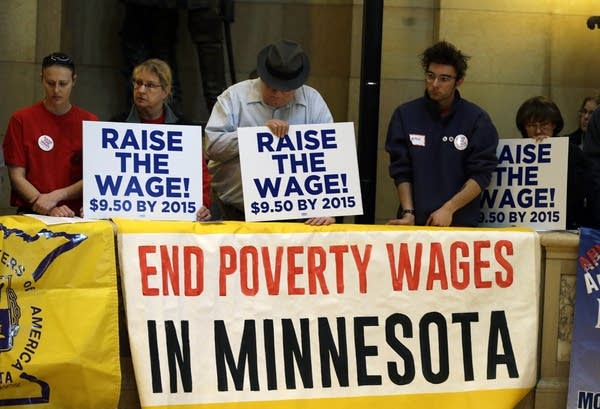Minn. lawmakers boost minimum wage to $9.50

Go Deeper.
Create an account or log in to save stories.
Like this?
Thanks for liking this story! We have added it to a list of your favorite stories.
Most workers in Minnesota will earn at least $9.50 an hour by 2016.
After several hours of contentious debate, the Minnesota House today passed a bill to make that the hourly wage by a vote of 71-60. The vote follows one by the Senate on Monday.
As a result, Gov. Mark Dayton is poised to sign the increase into law, making it the first boost to the state's minimum wage since 2005.
President Barack Obama took the opportunity to commend Minnesota's legislators on the vote.
Turn Up Your Support
MPR News helps you turn down the noise and build shared understanding. Turn up your support for this public resource and keep trusted journalism accessible to all.
"I urge Congress to follow Minnesota's lead, raise the federal minimum wage, and lift wages for 28 million Americans. Congress should listen to the majority of Americans who say it's time to give America a raise and help ensure that no American who works full time has to raise a family in poverty," Obama said in a statement.
'A good thing' vs. 'It bothers me'
The minimum wage debate in the House centered mostly on the effect higher hourly wages would have on the state's overall economy.
Supporters say increasing the wage will improve the conditions of hundreds of thousands of workers.
"A minimum wage increase is a way of government coming in and saying that we have to make the playing field better for people, better for everyone," said state Rep. David Bly, DFL-Northfield. "We will see it as a good thing in our economy as our economy goes forward."
But Republican critics said the increase will result in job cuts. State Rep. Mark Anderson, R-Lake Shore said resort owners in his central Minnesota district told him that, because of the higher wage, they'd cut back on employees.
"I'm a free market guy. I employed over 30 people in one business, and I'm just starting another one right now," Anderson said. "For the government to get involved in my decision of what I'm paying people, it bothers me."
The proposal would raise the minimum wage for large employers in steps from the current $6.15 an hour to $9.50 an hour by 2016. The deal also includes a 90-day training wage of $7.75 an hour for teen workers.
Future increases would be tied to inflation starting in 2018, but the commissioner of the state Department of Labor and Industry would be able to prevent inflationary increases if there is an economic downturn.
State Rep. Joe Radinovich, DFL-Crosby, said indexing the wage is good for workers.
"Every part of business expense goes up year to year. The cost of labor should be no different," Crosby said. "It provides a safeguard for those families so they don't have to wait around for the Legislature to have the right configuration to acknowledge the difficulties that they are having and acknowledge an appropriate minimum wage increase."
Timing questioned
Senate Democrats resisted indexing the wage for months but agreed to it on Monday -- just three days after House Democrats agreed to finance a new $90 million Senate Office Building. That sequence of events did not go unnoticed on the House floor.
"You guys traded small business owners' money for a Senate Office Building across the street," state Rep. Pat Garofalo, R-Farmington, told Democrats. "Live with it. Own it."
Garofalo suggested House DFL leaders agreed to the Senate's push for a new office building in exchange for the inflation mechanism in the minimum wage bill.
"Sometimes there are tradeoffs and horse trading that has to happen. But make no mistake of what is happening today, members and members of the public," Garofalo said. "What you are seeing today is a bargain among thieves. Small business owners are having money taken from them to pay for the Senate's new office building across the street."
House DFL leaders said there is no link between the minimum wage deal and the Senate Office Building, and that the timing is just a coincidence.
Democrats said Republicans were trying to change the subject to the office building because they know raising the minimum wage is popular with many Minnesotans.
"I don't think this is a tradeoff between small businesses and a Senate chamber," said state Rep. Tim Mahoney, DFL-St. Paul, who voted for the bill. "I think this is a tradeoff of helping people live a better life by making a decent enough living that they don't have to have the state pay for their housing, that they don't have to have the federal government pay their food stamps."
The House and Senate will begin their Easter/Passover break on Friday. They are expected to focus on a spending bill, a tax relief bill and a public works construction bill when they return.


